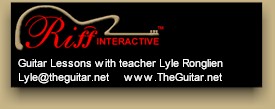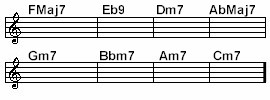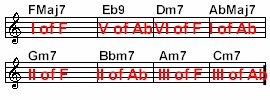Scroll through the lesson and click on notation/video/audio links to load the interactive players.
Please subscribe to get full access to all lessons for only $7.95/month PLUS 1 week free trial.

Riff Interactive lessons are
LESS expensive and
MORE interactive than alternatives!
More Info
|
|

Jazz Guitar For
Beginners
Lesson 5
Lyle:
Listen to the lesson sample to hear what you'll be learning to play. This is a 8
measure chord progression:
chord chart

Lyle: Listen how the harmony of the progression
changes or shifts with each new chord.
Lyle: Now try learning how to play the chords for
this progression:
Lyle:
Here's a looping jam track of just drums and bass for you to practice playing
the chord progression with:
Lyle:
Once you can play those chords well to the jam track it's time to learn other
chords to use. Instead of playing a FMaj7 for the first chord, you could play
FMaj9.
Lyle: You could play Eb13 instead of Eb9 for the
second chord.
Lyle: Here's another way to play the 8 bar
progression:
Lyle: It
might take a while to learn to play this progression but it should be a good
workout for you.
Lyle: Let's work with scales and playing a melody
against this jazz progression.
Lyle: This progression revolves around the key of
F major and F minor. You'll need to know these two
scales:
I_like_pie: Is
it best to pick with fingers, thumb or a pick?
Lyle: Either fingers or pick is
fine.
Greg:
There something of a rhythm to the scales you playing. What do you call
that?
Lyle: The rhythm is called "Swing". It's like the
shuffle beat.
Lyle: In this 8 bar chord progression it changes
key with each chord.
chord chart with keys

Lyle: It starts in the key of F, then to Ab, back
to F, then to Ab etc...
Lyle: When you're in the key of F major, you can
use the F major scale to play a melody.
Lyle: During any chord in the key of Ab you can
use the relative minor scale for Ab which is Fm.
Lyle:
Notice on the chart above I've listed how each chord
relates.
Lyle: Knowing your fretboard theory is very
helpful. I suggest checking out my series of lessons in the RiffInteractive
CD-ROM titled Fretboard Theory.
Lyle: The first chord Fmaj7 you play F maj scale,
the second chord you can play F min
scale.
Lyle: Here's an example of 8 bars of melody using
these two scale back and forth:
Lyle:
Playback the TAB for solo part 1 and watch and listen as it shifts between the
two scales.
Lyle:
Here's another solo section that alternates between the F maj and F min scales
for each chord:
Lyle:
The third part of the solo uses pentatonic scales. During the chords that are in
the key of F you can play the relative minor pentatonic scale for F which is Dm
pentatonic:
Lyle:
During all the other chords that are in the key of Ab you can play the F minor
pentatonic which is the relative minor of Ab.
Lyle:
Here's how I used the pentatonics against the chord
progression:
dh: Thank you,
now I understand the progression
miki091: That's sounds real nice, kind of Les
Paul-ish
Greg:
It sounds like you start you start each lick in the scale on corresponding chord
in the progression.
Lyle: We all like the
pentatonics!
Lyle: Yes Greg, I switch scales for each
chord. In Jazz you have to get used to that sort
of thing for improvising.
Clarence: do you think the audience can tell if you are
playing simple patterns up and down like this?,
because that's about all I can do :)
Lyle: I can but others might
not. The good jazz musicians can tell by ear
what you're doing most of the time. The non musicians can't tell. They just
listen for what they like to hear. My motto is to keep it simple and melodic.
Make it bluesy and funky. I don't like to over play.
Lyle: And if a pentatonic riff sounds good, then
do it!
RTF: Does
having an understanding of theory really help that much or knowing scales and
chords?
Lyle: RTF, yes, learn as much theory as you can
if you want to explore music deeper.Greg: Your new Speed Tech. and Arp. Applications CD's
are great. Looking to get the Smooth Jazz CD's. Any good CD's in your list you
can recommend for more background?
Lyle: Greg, thanks! I suggest Fretboard Theory,
All the Jam Session CDs too, they touch on applying theory with the chord
progressions.
wedaws: This may be over playing but could you use the
super locrian over the Eb9 chord?
Lyle: Yes you can wedaws.
Lyle: See you at the next lesson!
|
<< load notation from left
|
|
<< load audio from left
|
<< load audio from left
|